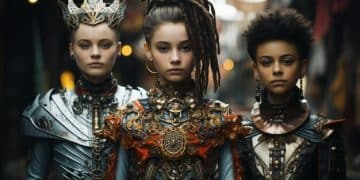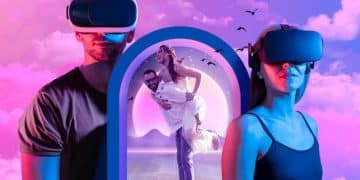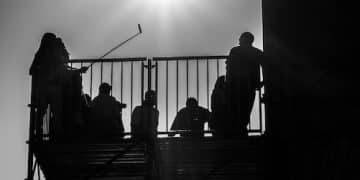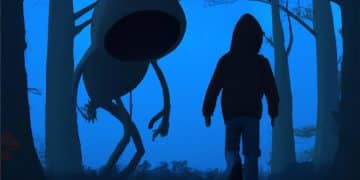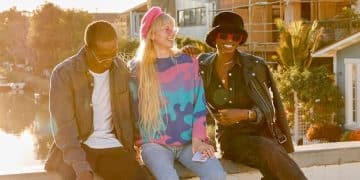Living Lore: How Subcultures Are Reshaping Storytelling in the US
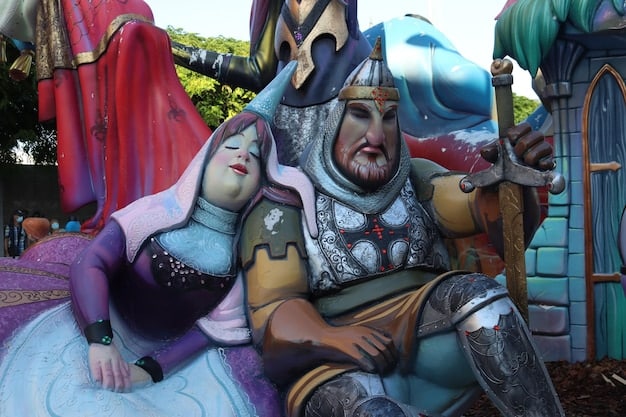
Living Lore subcultures in the US extend beyond traditional cosplay by embodying fictional worlds through elaborate costumes, immersive role-playing, and community storytelling, significantly impacting contemporary narrative creation and fan engagement.
Dive into the fascinating world where cosplay evolves into living lore, as passionate subcultures in the US bring fictional universes to life, leaving a profound mark on storytelling.
The Evolution from Cosplay to Living Lore
Cosplay, or costume play, has long been a vibrant part of fan culture. However, a new phenomenon is emerging: living lore. This goes beyond simply dressing up; it involves immersing oneself fully in a fictional world, creating a shared narrative experience that blurs the lines between reality and fantasy.
In the United States, this trend is gaining momentum, with various subcultures adopting and adapting beloved stories, games, and myths. These groups aren’t just fans; they are active participants in the ongoing evolution of these narratives.

Defining Living Lore
What exactly constitutes living lore? It’s more than just dressing up as a character. It involves a deep understanding and embodiment of the source material, coupled with the creation of original storylines and interactions within that established universe.
- Immersive Role-Playing: Participants stay in character for extended periods, interacting with each other and the environment according to the rules and lore of the fictional world.
- Community Storytelling: The creation and evolution of the lore is a collaborative process, with members contributing their own ideas and experiences to the ongoing narrative.
- Elaborate Costuming and Props: Attention to detail is paramount, with costumes and props meticulously crafted to accurately represent the characters and objects of the fictional world.
Ultimately, living lore is about building a living, breathing world where fans can actively participate in the stories they love.
The Rise of Immersive Subcultures in the US
The US has become a fertile ground for immersive subcultures centered around living lore. These groups are diverse, ranging from those focused on fantasy and science fiction to those rooted in historical reenactment and mythology.
Several factors contribute to this rise, including the increasing accessibility of high-quality costuming materials, the growth of online communities that facilitate collaboration and information sharing, and a growing desire for authentic, shared experiences.
Examples of Thriving Living Lore Communities
Several examples illustrate the breadth and depth of the living lore phenomenon in the US:
- LARP (Live Action Role-Playing) Groups: These groups create elaborate scenarios based on fantasy, science fiction, or historical settings, allowing participants to physically act out their characters’ roles.
- Steampunk Communities: These groups embrace a Victorian-era aesthetic combined with futuristic technology, often creating original inventions and narratives within this steampunk universe.
- Renaissance Fairs and Historical Reenactments: While not strictly fictional, these events allow participants to immerse themselves in a specific historical period, adopting the customs, clothing, and language of the time.
These communities demonstrate the diverse ways in which living lore is being embraced and adapted across the country.
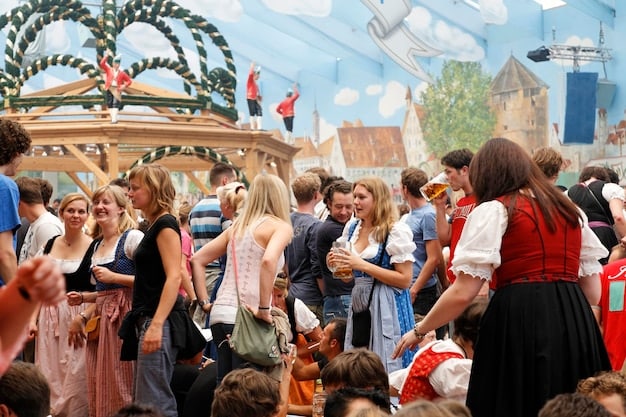
The Impact of Living Lore on Storytelling
The rise of living lore subcultures is having a significant impact on contemporary storytelling. These communities are not only consuming stories but actively shaping and evolving them.
This impact can be seen in several ways, from influencing the creation of new content to altering the way existing stories are interpreted and experienced.
How Living Lore Influences Narrative Creation
Living lore communities provide valuable feedback and inspiration for writers, game designers, and other content creators:
- Fan Feedback and Adaptation: Creators often engage with these communities, incorporating their ideas and feedback into future installments of their works.
- New Forms of Narrative: The collaborative storytelling inherent in living lore is inspiring new forms of narrative, such as interactive fiction and transmedia storytelling.
- Challenging Canon: Living lore communities sometimes challenge established canon, creating alternative storylines and interpretations that resonate with their members.
By challenging and expanding the boundaries of traditional storytelling, living lore is contributing to a more dynamic and participatory narrative landscape.
The Role of Technology in Fostering Living Lore
Technology plays a crucial role in enabling and facilitating the growth of living lore subcultures. From online communities to digital tools for costuming, technology is empowering fans to create and share their immersive experiences.
The internet provides a platform for connecting with like-minded individuals, sharing ideas, and collaborating on projects, while digital tools are making it easier than ever to create high-quality costumes and props.
Digital Tools and Online Communities
Several technological advancements have contributed to the rise of living lore:
- Social Media Platforms: Platforms like Facebook, Reddit, and Discord provide spaces for communities to organize events, share resources, and discuss lore.
- 3D Printing and Digital Design: These technologies allow fans to create highly detailed and accurate replicas of props and costume components.
- Online Learning Resources: Tutorials and workshops on costuming, prop making, and other skills are readily available online, making it easier for newcomers to participate.
These technologies are democratizing access to the tools and resources needed to create and participate in living lore experiences.
The Psychological and Social Benefits of Living Lore
Beyond its impact on storytelling, living lore offers significant psychological and social benefits for its participants. These communities provide a sense of belonging, foster creativity, and offer an opportunity for self-expression.
By immersing themselves in fictional worlds, participants can explore different identities, develop new skills, and build meaningful connections with others.
Personal Growth and Community Building
The benefits of participating in living lore communities include:
- Enhanced Creativity and Problem-Solving Skills: Creating costumes, props, and storylines requires creativity and problem-solving skills, which can translate to other areas of life.
- Improved Social Skills and Communication: Interacting with others in character and collaborating on projects helps develop social skills and communication abilities.
- Increased Self-Esteem and Confidence: Successfully embodying a character and contributing to a community can boost self-esteem and confidence.
These benefits highlight the positive impact that living lore can have on individuals’ lives.
The Future of Living Lore: Challenges and Opportunities
As living lore continues to evolve, it faces both challenges and opportunities. Maintaining authenticity, addressing issues of inclusivity, and navigating the complexities of intellectual property are some of the key challenges.
However, these challenges also present opportunities for growth and innovation, as communities strive to create more inclusive, sustainable, and impactful experiences.
Navigating the Future of Immersive Storytelling
Some key considerations for the future of living lore include:
- Ensuring Inclusivity and Accessibility: Making these communities welcoming and accessible to people of all backgrounds and abilities is crucial.
- Addressing Intellectual Property Concerns: Navigating the legal landscape surrounding copyrighted material requires careful attention and respect for creators’ rights.
- Promoting Sustainability and Ethical Practices: Ensuring that costuming and prop making are done in a sustainable and ethical manner is important.
By addressing these challenges and embracing the opportunities that lie ahead, living lore can continue to thrive and evolve as a powerful force in storytelling and community building.
| Key Concept | Brief Description |
|---|---|
| 🎭 Living Lore | Beyond cosplay, embodying fictional worlds through role-play and community stories. |
| 🧑🤝🧑 Immersive Subcultures | US groups reshaping storytelling, engaging deeply with sources. |
| 💻 Tech’s Role | Online platforms and digital tools enhance costume creation and connection. |
| 🌱 Personal Benefits | Improved creativity, social skills, and community involvement. |
FAQ
▼
Living lore goes beyond simply dressing up. It involves active, immersive participation in a fictional world, complete with character embodiment and collaborative storytelling that evolves the lore itself.
▼
Examples include LARP groups creating elaborate scenarios, Steampunk communities blending Victorian aesthetics with technology, and Renaissance fairs offering immersive historical experiences.
▼
These communities provide creators with valuable feedback, inspire new narrative forms like interactive fiction, and sometimes even challenge established canon with alternative storylines.
▼
Technology facilitates connection through online communities, and enables the creation of detailed costumes and props through digital tools like 3D printing and online tutorials.
▼
Participants often experience enhanced creativity, improved social skills, a sense of belonging, and increased self-esteem through self-expression within these immersive communities.
Conclusion
Living lore subcultures represent a dynamic and evolving intersection of fan culture, storytelling, and community building. By actively participating in the creation and evolution of fictional worlds, these groups are not only enriching their own lives but also shaping the future of narrative in profound ways.
